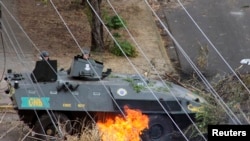CARACAS —
In one middle-class neighborhood of San Cristobal city, demonstrators manning a barricade on Thursday in an upper-middle-class neighborhood said National Guard troops had fired teargas at them but failed to dislodge their protest.
Venezuelans began a week-long national holiday on Thursday as some protests still simmer, but President Nicolas Maduro's government is hoping the break will take the heat out of the nation's worst unrest in a decade.
The 51-year-old successor to Hugo Chavez brought forward by two days a long weekend national holiday for Carnival when Venezuelans traditionally abandon cities and head for Caribbean coast beaches to relax and party.
There will be another day off for the March 5 anniversary of Chavez's death from cancer, meaning a week-long break that officials hope will dampen student-led street protests against the government.
In the capital, Caracas, which has seen most of the at least 13 fatalities from this month's unrest, opposition supporters gathered in wealthy eastern neighborhoods.
In familiar scenes from the last two weeks, when one group of demonstrators tried to block a six-lane highway that runs nearby, security forces fired teargas to disperse them.
“How can you enjoy carnival when people are dying?” read one banner waved by students at drivers in eastern Caracas as many people began to hit the highways for the coast.
In the city center, red-clad Maduro supporters rallied in remembrance of deadly price riots 25 years ago, which the president says helped propel Chavez to power a decade later.
The students want Maduro to quit over grievances ranging from high inflation and shocking crime rates to shortages of basic food and alleged repression of political rivals.
Though they have presented the biggest challenge to his 10-month-old administration and the worst unrest since street rallies against Chavez a decade ago, there is no sign Maduro could be ousted.
On the contrary, he seems to be regaining the initiative by offering dialog with foes and consolidating his leadership of the Socialist Party by uniting factions against a common enemy.
Injuries, arrests
About 150 people have been injured during the two-week crisis, and more than 500 people arrested, authorities say.
Of those, 55 remain behind bars. They are mostly protesters but also include seven intelligence agents and security officials accused of being involved in the shooting of two people in downtown Caracas after a Feb. 12 rally that sparked the worst trouble.
The government recognizes security forces were involved in three of the 13 fatalities. It says about 50 people have died in total due to the protests, including indirectly linked cases such as people unable to reach hospital due to blocked roads.
Venezuela's volatile western region, in the Andean foothills on the Colombian border, has seen the worst unrest, with students and security forces facing off day after day.
Story continues below photogallery:
Story continues below photogallery:
In one middle-class neighborhood of San Cristobal city, demonstrators manning a barricade on Thursday in an upper-middle-class neighborhood said National Guard troops had fired teargas at them but failed to dislodge their protest.
A Reuters reporter saw them reinforcing the barrier, winding wire around tree branches to strengthen the structure of chain-link fencing and corrugated metal sheets.
“How long are we going to let them abuse us?” said one man, his shirt tied around his face.
He accused protesters in Caracas of lacking the strength of their counterparts in San Cristobal and elsewhere.
“The Caraquenos are only interested in parties, and not in getting rid of this joke of a government,” he complained.
“The Caraquenos are only interested in parties, and not in getting rid of this joke of a government,” he complained.
'Spoiling Carnival'
Maduro accused foes of trying to wreck Venezuelans' cherished Carnival celebrations and mocked opposition leaders as part of a wealthy elite flying out for the break.
“There's not a single flight out left. They're all going abroad while they try and deprive the farm worker, the laborer, the student, of their Carnival,” Maduro thundered in a speech to supporters late on Wednesday. “I'm not going to allow it. Carnival 2014 is going ahead!”
In an attempt to calm tensions, Maduro hosted business and church leaders, and some opposition politicians, at a “peace conference” in his presidential palace on Wednesday night.
Shown live on state TV, the occasion gave Venezuelans the unusual sight of businessmen, whom Maduro frequently excoriates as “savage capitalists” and ringleaders of an “economic war” against him, debating with the president.
The attendees were each allowed five minutes to speak, with the head of Venezuela's main business chamber Jorge Roig criticizing Maduro's “failed” economic model.
Major opposition figures did not attend, however.
The main opposition leader Henrique Capriles said he did not want to take part in a “photo op” without signs Maduro was serious about making concessions or addressing real problems.
Firebrand protest leader Leopoldo Lopez, who leads a radical wing of the opposition, is in jail on charges of fomenting this month's unrest. And the umbrella Democratic Unity opposition organization's executives declined to attend what they called a “pretend dialogue.”
With calls for both sides to talk pouring in from the Vatican to the White House, the opposition's strategy could backfire in terms of wider international opinion.
Maduro has received strong support from leftist allies such as Bolivia and Cuba, and only some relatively muted criticism from other nations including Chile and Colombia.
Regional heavyweight Brazil, whom Latin American governments increasingly look to for a lead, has kept quiet, saying Venezuela's problems are for it alone to resolve.
“The Maduro government is on a PR mission and initial indications are that it is winning,” the London-based Latinnews newsletter said in an analysis on the crisis.
“The 'Exit' movement seeking Maduro's resignation has lost momentum and, at the end of the day, it didn't appear to offer ordinary citizens anything politically tangible, other than a vent for their extreme frustration with the social and economic crisis,” it said. “There doesn't appear to be a 'Plan B'.”






